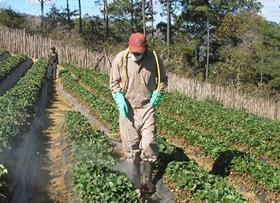
Global agricultural output must be doubled by the year 2050 to feed the increasing population and counter the effects of climate change, thus avoiding a food crisis on a massive scale.
That is the verdict of a new report released by the G8's Italian presidency ahead of a meeting of G8 agricultural leaders in Treviso, Italy later in the month.
Leaders from G8 countries Canada, France, Germany, Italy, Japan, Russia, the UK and the US will discuss the state of the world's food supply, with the report suggesting that the food crisis of the past two years could 'become structural in much of the world'.
Friedhelm Schmider, director general of the European Crop Protection Association (ECPA), said that European policymakers should be realistic about maintaining and increasing production through advanced technologies – in turn critically assessing less productive techniques and recognising appropriate pest control and plant disease tools.
'Climate change will escalate pest pressure – we must keep pace with these changes and make sure our agricultural policies are in tune with farm reality,' he said. 'Unfortunately, the EU's agricultural and pest management policies are currently heading in the opposite direction, actively reducing the options available to farmers without adequate scientific assessment of risk. Unless we see a change of direction, farmers will have a limited product portfolio to fight pests at a time when the world most needs solutions.'
He added that pesticides should not be viewed as the problem but the solution to problems of optimising land potential, keeping plants healthy and eliminating plant disease.
'The G8's policy document paints a distressing but realistic scenario,' Mr Schmider noted. 'In Europe, we have a great agricultural capacity but an enormous challenge ahead and not many years to plan; henceforth, our actions will influence our ability to help feed ourselves and the world.
'Above all, we must not let our relative affluence cloud our vision and cut us off from the reality of sustaining the food supply,' he said.



